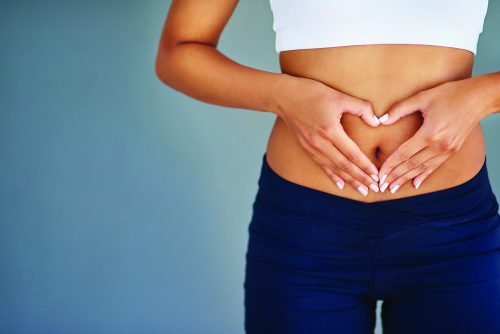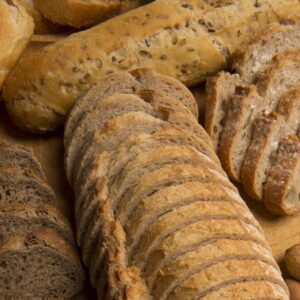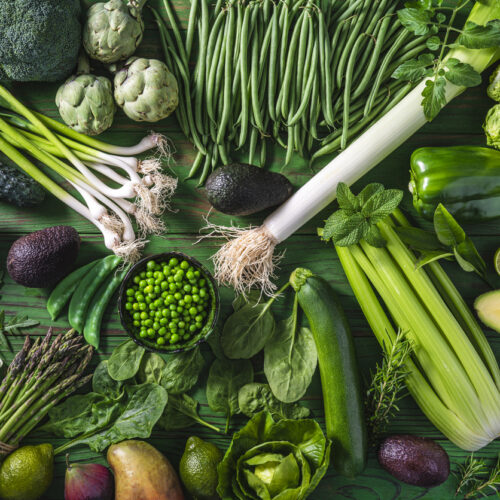
Emerging research shows that our gut bacteria are an internal barometer of our current and future health, says dietitian Katrina Pace. Keeping our gut bacteria healthy is good for our overall health. When they’re not well, our health suffers too.
What are gut bacteria?
When we talk about gut bacteria we mean not just the range of bacteria, but also the viruses, yeasts and fungi that we now know also live in our digestive systems. Together they are called the ‘gut microbiota’ and they help to keep our intestine lining healthy and to absorb nutrients from our food and drink more effectively.
Gut bacteria also make vitamins that support our body functions and help the body make many other enzymes, neurotransmitters and hormones. Different types of gut bacteria do different things: some help reduce inflammation, some help digest and metabolise nutrients, and others can turn off and on genes that trigger disease. No wonder gut bacteria are attracting so much attention!
What’s new?
Gut bacteria have a role to play even before birth. Once it was thought we had no bacteria until we were born, but recent studies have shown that bacteria and viruses can be transferred during pregnancy. Scientists now know that our gut bacteria vary in the first year after birth, depending on whether we were born by caesarean section or not, and whether we have older brothers or sisters. When born by vaginal birth, the newborn is exposed to bacteria from the mother, which adds to the amount and diversity of the infant’s gut bacteria, and the presence of older siblings seems to add further bacterial exposure. By the time we are about three years old we have a fully developed range of gut bacteria.
Risk of disease
It seems the variety of gut bacteria we have could influence whether we get eczema, hay fever, asthma or food allergies. And as we grow, the state of our gut bacteria could influence our risk of getting type 1 or type 2 diabetes, heart disease, metabolic syndrome, inflammatory bowel disease, irritable bowel syndrome, liver disease, skin disorders, depression or anxiety.
Can gut bacteria play a role in our mental health?
Serotonin is a neurotransmitter which helps stabilise moods and emotions. Some of the most common antidepressants work at making serotonin hang around the body longer. Gut bacteria have a crucial role to play in helping the body make serotonin. The links between gut bacteria and mental health is a new and exciting area of research.
Can’t sleep? Are your tummy bugs to blame?
Hormones and neurotransmitters help keep our body clock ticking. But it now looks as if our gut bacteria act like mini clocks, keeping these hormones regular. Changes to your body clock through jet lag, missing meals or fasting diets can also change the composition of your gut bacteria.
IBS: Where stress, gut bacteria and food intolerances meet
Irritable bowel syndrome (IBS) is possibly the most common way our gut bacteria tell us they’re not happy. One of the main symptoms of IBS is tummy pain, and it can start at a specific time of physical or emotional stress. Stress, and particularly long-term stress, is something we know increases pain around the tummy area (called ‘visceral sensitivity’). Recent research shows that both short- and long-term stress can also change the make-up of your gut bacteria (for the worse).
Two of the most successful treatments for IBS are stress management, and a low-FODMAP diet. FODMAP is an acronym for Fermentable Oligosaccharides Disaccharides Monosaccharides and Polyols. Carbohydrates are the main food for gut bacteria but FODMAPs feed the bacteria that are growing out of balance and causing problems. However, different bacteria preferentially eat different foods, so with a low-FODMAP diet other gut bacteria are given a chance to grow back. This is why, over time, FODMAP foods can be gradually and successfully reintroduced.
Two recent studies found 72 to 86 per cent of IBS patients had fewer symptoms on a low-FODMAP diet. One study also provided more evidence of the effect on gut bacteria, with the low-FODMAP diet increasing the richness and diversity of one type of bacterium. The other study, which followed people over 18 months, found most had successfully reintroduced FODMAP foods. A low-FODMAP diet can also be a low-fibre diet, so once symptoms are under control the reintroduction of higher FODMAP-containing foods is recommended in quantities that are well tolerated.
Exercise gives gut bacteria a workout too.
We all know that exercise is important in keeping us physically and mentally well but emerging research suggests that exercise can also change our gut bacteria. In a study comparing members of a rugby team to a less active group of men, a wider range of gut bacteria (which is good) was seen in the rugby players, even after dietary differences were accounted for. Studies on active mice and rats also showed a larger range of gut bacteria compared to the more sedentary animals. This connection between gut bacteria and exercise is so new that we are not exactly sure how it works. However, it could be a combination of the effect of exercise on bile acid production (bile acid is antimicrobial so may reduce some bacteria and increase others), increased speed of movements through the gut, reduced stress and anxiety and weight loss — all things that keep your gut healthy.
Gut health Q & A
Q. How can fermented foods help me (and my gut) feel better?
A. Fermented foods like sauerkraut, kimchi, kombucha and kefir contain vast amounts of bacteria and yeast. Traditionally, they have been known to have healing properties, as well as being a way of preserving food. The bacteria in fermented foods can affect our gut bacteria and help good bacteria grow.
Q. Are beans and lentils bad for my gut?
A. No — quite the opposite, in fact. Beans and lentils contain important fibres which are a great food for healthy bacteria. But be careful. It’s best to introduce any new food for bacteria slowly. If you don’t normally eat beans and lentils, start with 1—2 tablespoons every 2—3 days, and build up slowly from there. Got tummy problems already? Some beans and lentils may cause you problems if you have an intolerance to certain FODMAP foods, but there are other choices, e.g. canned or cooked lentils. The offending FODMAPs leach from the lentils when cooked, so just drain off the liquid.
Q. Are grains bad for my gut?
A. Whole grains contain fibre and carbohydrates — the favourite food of good gut bacteria. Studies show that whole grains and other fibres in our diet will help us grow the best mix of gut bacteria. However, if you have a bad mix of gut bacteria and a lot of tummy problems, you might need to restrict your grains and carbohydrates to help your gut heal. Over time most people are likely to be able to manage whole grains. Some people find soaked and sprouted grains are more easily digested.
Emerging research
Despite a vast amount of research there is so much we still don’t know about our gut bacteria and its interaction with the rest of the body.
Researchers from Massey University and Plant & Food Research want to figure out what influence a person’s long-term dietary fibre intake has on how gut bacteria respond to prebiotics. “We believe that if someone is already consuming foods high in dietary fibre, the gut bacteria will probably respond in a different way to prebiotics, compared to the gut bacteria of an individual with a lower dietary fibre intake,” says PhD student Genelle Healey. Participants will also have their body composition (fat mass, muscle, bone, etc.) analysed, as there may be links between body composition and the types of bacteria present in the gut.
US researchers working with mice have suggested a way in which gut bacteria could make certain metabolic changes that in turn influence the development (or otherwise) of cancer.
The hygiene hypothesis could now be replaced by the biodiversity hypothesis: our reduced contact with the natural environment and biodiversity could adversely affect the gut bacteria and therefore immune function. For example, it’s been shown that sanitised homes are reducing the composition of the bacterial classes on people’s skin. While the links from hygiene/biodiversity and allergy are not fully understood, there is a large body of research supporting the idea that our risk for developing allergic diseases is strongly influenced by the composition and diversity of our gut bacteria. So let’s get out there and get dirty!
Follow the three Ps to keep your gut bacteria happy
So can we influence the make-up of our gut bacteria to improve our health and well-being? And will maintaining healthy gut bacteria help keep ill health at bay? The answer is yes.
More peace
Minimise stress. Stress and anxiety are bad for our gut bacteria.
- Every week try to do at least 2 1/2 hours of moderate exercise, or 1 1/4 hours of vigorous exercise.
- Be aware of what’s going on around you and accept it for what it is. Identify what are helpful thoughts and what are not.
- Ask for a hand. Sometimes having more peace needs the support and assistance of others.
Less processed food
A diet full of packaged foods that are high in processed fats and sugars and low in fibre will lead to lower diversity of gut bacteria and the overproduction of bacteria that can cause inflammation. Enjoy homemade high-fibre whole foods made from scratch whenever you can.
Daily probiotics and prebiotics
Probiotics are live bacteria that can help boost the numbers and types of good bacteria in our gut. Probiotics can be supplemented through commercially-produced probiotic capsules or drinks. Or we can get our daily intake of live bacteria by eating fermented foods, such as sauerkraut, kimchi, kombucha or kefir. Start probiotics slowly and increase the amount over 1—2 weeks.
Prebiotics are foods that feed our bacteria. Since carbohydrates are the favoured food of bacteria it is important to have them in our diet. But we’re not talking about white bread and cake. Think wholegrain and high fibre. Choose as wide a variety of high-fibre foods as possible, and eat some each day.
Time to ditch the hand sanitiser?
We know antibiotics damage the bacteria in the gut — both good and bad bacteria. If having the right bacteria is important to our health and well-being, we need to also be careful of the antibacterial products we use in our mouths and on our skin.
The bacteria in our mouths and on our skin also contribute to our health and well-being. But it’s important to have the right bacteria in the right place. Having the right bacteria in your mouth will create a favourable ‘biofilm’ to help protect teeth from dietary acids. Again, the right diversity of bacteria in this biofilm is protective whereas the wrong balance is damaging.
The use of antibacterial hand sanitisers has been examined as a possible explanation for increased resistant strains of bad bacteria. Over-clean hands can actually damage skin and help bad bacteria to grow.
Article sources and references
- Barbara G et al. 2011. The immune system in irritable bowel syndrome. Journal of Neurogastroenterology & Motility 17:349—59https://www.ncbi.nlm.nih.gov/pubmed/22148103
- Cerdá B et al. 2016. Gut microbiota modification: another piece in the puzzle of the benefits of physical exercise in health? Frontiers in Physiology 7:article 51https://www.ncbi.nlm.nih.gov/pubmed/26924990
- Cheema AK et al. 2016. Chemopreventive metabolites are correlated with a change in intestinal microbiota measured in A-T mice and decreased carcinogenesis. PLOS ONE doi:10.1371/journal.pone.0151190https://journals.plos.org/plosone/article?id=10.1371/journal.pone.0151190
- Cho CE & Norman MN. 2013. Cesarean section and development of the immune system in the offspring. American Journal of Obstetrics & Gynecology 208:249—54https://www.ncbi.nlm.nih.gov/pubmed/22939691
- Distrutti E et al. 2016. Gut microbiota role in irritable bowel syndrome: New therapeutic strategies. World Journal of Gastroenterology 22:2219—41https://www.ncbi.nlm.nih.gov/pubmed/26900286
- Drago L et al. 2016. Skin microbiota of first cousins affected by psoriasis and atopic dermatitis. Clinical and Molecular Allergy DOI:10.1186/s12948-016-0038-zhttps://clinicalmolecularallergy.biomedcentral.com/articles/10.1186/s12948-016-0038-z
- Graf D et al. 2015. Contribution of diet to the composition of the human gut microbiota. Microbial Ecology in Health and Disease doi.org/10.3402/mehd.v26.26164https://www.ncbi.nlm.nih.gov/pubmed/25656825
- Han K et al. 2015. Contrasting effects of fresh and fermented kimchi consumption on gut microbiota composition and gene expression related to metabolic syndrome in obese Korean women. Molecular Nutrition & Food Research 59:1004—8https://www.ncbi.nlm.nih.gov/pubmed/25688926
- Hanski I et al. 2012. Environmental biodiversity, human microbiota, and allergy are interrelated. PNAS 109:8334—9https://www.pnas.org/content/109/21/8334
- Kaidonis J & Townsend G. 2016. The ‘sialo–microbial–dental complex’in oral health and disease. Annals of Anatomy-Anatomischer Anzeiger 203:85—9https://www.ncbi.nlm.nih.gov/pubmed/25758745
- Karlsson F et al. 2013. Assessing the human gut microbiota in metabolic diseases. Diabetes 62:3341—9https://www.ncbi.nlm.nih.gov/pubmed/24065795
- Lopetuso LR. et al 2015. The therapeutic management of gut barrier leaking: the emerging role for mucosal barrier protectors. European Review for Medical and Pharmacolical Science 19:1068—76https://www.ncbi.nlm.nih.gov/pubmed/25855934
- Maagaard L et al. 2016. Follow-up of patients with functional bowel symptoms treated with a low FODMAP diet. World Journal of Gastroenterology 22: 4009—19https://www.ncbi.nlm.nih.gov/pmc/articles/PMC4823251/
- McIntosh K et al. 2016. FODMAPs alter symptoms and the metabolome of patients with IBS: a randomised controlled trial. Gut doi:10.1136/gutjnl-2015-311339https://www.ncbi.nlm.nih.gov/pubmed/26976734
- Moloney RD. 2016. Stress and the microbiota–gut–brain axis in visceral pain: relevance to irritable bowel syndrome. CNS neuroscience & therapeutics 22:102—17https://www.ncbi.nlm.nih.gov/pubmed/26662472
- Oriach CS et al. 2016. Food for thought: The role of nutrition in the microbiota-gut-brain axis. Clinical Nutrition Experimental 6:25—38https://www.sciencedirect.com/science/article/pii/S235293931600004X
- Paulose JK et al. 2016. Human gut bacteria are sensitive to melatonin and express endogenous circadian rhythmicity. PLOS ONE doi.org/10.1371/journal.pone.0146643https://journals.plos.org/plosone/article?id=10.1371/journal.pone.0146643
- Salonen A & de Vos WM. 2014. Impact of diet on human intestinal microbiota and health. Annual Review of Food Science and Technology 5:239—62https://www.ncbi.nlm.nih.gov/pubmed/24387608
- Strachan DP. 1989. Hay fever, hygiene, and household size. British Medical Journal 299:1259—60https://www.ncbi.nlm.nih.gov/pubmed/2513902
- Xu X et al. 2013. Gut microbiota, host health, and polysaccharides. Biotechnology Advances 31:318—37https://www.ncbi.nlm.nih.gov/pubmed/23280014
www.healthyfood.com










